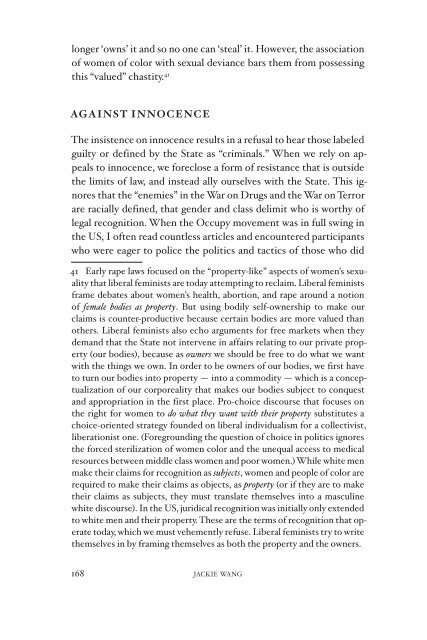Lies: A Journal of Materialist Feminism - Libcom
Lies: A Journal of Materialist Feminism - Libcom
Lies: A Journal of Materialist Feminism - Libcom
You also want an ePaper? Increase the reach of your titles
YUMPU automatically turns print PDFs into web optimized ePapers that Google loves.
longer ‘owns’ it and so no one can ‘steal’ it. However, the association<br />
<strong>of</strong> women <strong>of</strong> color with sexual deviance bars them from possessing<br />
this “valued” chastity. 41<br />
AGAINST INNOCENCE<br />
The insistence on innocence results in a refusal to hear those labeled<br />
guilty or defined by the State as “criminals.” When we rely on appeals<br />
to innocence, we foreclose a form <strong>of</strong> resistance that is outside<br />
the limits <strong>of</strong> law, and instead ally ourselves with the State. This ignores<br />
that the “enemies” in the War on Drugs and the War on Terror<br />
are racially defined, that gender and class delimit who is worthy <strong>of</strong><br />
legal recognition. When the Occupy movement was in full swing in<br />
the US, I <strong>of</strong>ten read countless articles and encountered participants<br />
who were eager to police the politics and tactics <strong>of</strong> those who did<br />
41 Early rape laws focused on the “property-like” aspects <strong>of</strong> women’s sexuality<br />
that liberal feminists are today attempting to reclaim. Liberal feminists<br />
frame debates about women’s health, abortion, and rape around a notion<br />
<strong>of</strong> female bodies as property. But using bodily self-ownership to make our<br />
claims is counter-productive because certain bodies are more valued than<br />
others. Liberal feminists also echo arguments for free markets when they<br />
demand that the State not intervene in affairs relating to our private property<br />
(our bodies), because as owners we should be free to do what we want<br />
with the things we own. In order to be owners <strong>of</strong> our bodies, we first have<br />
to turn our bodies into property — into a commodity — which is a conceptualization<br />
<strong>of</strong> our corporeality that makes our bodies subject to conquest<br />
and appropriation in the first place. Pro-choice discourse that focuses on<br />
the right for women to do what they want with their property substitutes a<br />
choice-oriented strategy founded on liberal individualism for a collectivist,<br />
liberationist one. (Foregrounding the question <strong>of</strong> choice in politics ignores<br />
the forced sterilization <strong>of</strong> women color and the unequal access to medical<br />
resources between middle class women and poor women.) While white men<br />
make their claims for recognition as subjects, women and people <strong>of</strong> color are<br />
required to make their claims as objects, as property (or if they are to make<br />
their claims as subjects, they must translate themselves into a masculine<br />
white discourse). In the US, juridical recognition was initially only extended<br />
to white men and their property. These are the terms <strong>of</strong> recognition that operate<br />
today, which we must vehemently refuse. Liberal feminists try to write<br />
themselves in by framing themselves as both the property and the owners.<br />
168<br />
JACKIE WANG

















